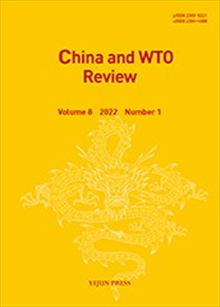간행물
China and WTO Review KCI 등재 SCOPUS

- 발행기관 이준국제법연구원
- 자료유형 학술지
- 간기 반년간
- ISSN 2383-8221 (Print)2384-4388 (Online)
- 수록기간 2015 ~ 2023
- 주제분류 사회과학 > 법학 사회과학 분류의 다른 간행물
- 십진분류KDC 341DDC 321
권호리스트/논문검색
Volume 2 Number 1 (2016년 3월) 9건
Editorial
1.
2016.03
구독 인증기관·개인회원 무료
Article
2.
2016.03
구독 인증기관 무료, 개인회원 유료
In 1999, Professor Philip Nichols argued that FCPA-style home country laws are efficient in combating transnational bribery, unlike host country regulation and corporate selfregulation. Observing feeble results obtained in 15 years of OECD Anti-bribery Convention, we find arguments for amending this assertion; home countries, aside from enforcing their own laws banning foreign bribery, should reconsider the classical ways of fighting transnational corruption, by helping host governments in their anti-corruption efforts and by encouraging their own corporations to join international dialogic webs. After presenting an original analysis of the reasons behind the limited impact of FCPA-style action, we would then further argue for the two alternative solutions backed by home states, looking respectively at the spectacular results of the anti-corruption campaign in Romania with US support, and at China’s recent position that her corporations should adhere to international private standards on foreign bribery.
6,400원
3.
2016.03
구독 인증기관 무료, 개인회원 유료
This paper examines the new trends of interaction between the legal transformations in China and the international investment treaties, focusing on the legal reforms after the Fourth Plenary Session of the Eighteenth Party Central Committee Fourth Plenary Session of the 18th Party Central Committee of the PRC of 2014 (2014 FPS). It envisages that the 2014 FPS will impose significant influence on the current legal system in China, on the forthcoming Foreign Investment Law of China, and eventually on the negotiation and application of the international investment treaties concluded by China because the CPC Central Committee Decision on Certain significant Issues regarding the Comprehensive Promotion of Law (PCC Decision) has demonstrated the directions of legal constructions and reforms explicitly and comprehensively from the administrative, judicial, social, and jurist perspectives, which constitutes the most inclusive PCC Decision regarding Chinese law and justice.
8,400원
Current Development
4.
2016.03
구독 인증기관 무료, 개인회원 유료
This research offers a concise retrospect on the South-South Coalition Strategy within multilateral trade negotiations of the GATT/WTO framework. The SSC strategy evolved in the postwar era, when the South integrated itself to demand for a New International Economic Order featured by fairness of outcome in international economic rules and activities. It then encountered an opponent trend of neo-liberalism, through which the South practically decided to sectoral exchange of economic interests with the North. From the new millennium onward, the South is learning to adopt a more issue-specific SSC strategy in trade negotiations. Although a question is arising for the future of SSC because of some emerging nations rising out from the traditional South group, a timely reflection from an evolutionary perspective would facilitate the understanding of the SSC strategy for weak countries to establish a fairer international economic order.
4,900원
5.
2016.03
구독 인증기관 무료, 개인회원 유료
Building the 21st Century Maritime Silk Road is a new initiative for international cooperation. It will have a positive impact on the peaceful use of the South China Sea by encouraging a Code of Conduct to Parties in the South China Sea between China and ASEAN members; realizing a breakthrough of jointly developing oil and gas resources in the area; promoting comprehensive cooperation in maritime non-traditional security field; and providing a peaceful external environment for the South China Sea dispute settlement. The South China Sea dispute is a negative challenge to building the 21st Century Maritime Silk Road. However, the pace building should not be stopped because of it. In the future, the 21st Century Maritime Silk Road will be on the international consensus as an international legal regime. Also, it will improve the domestic legal system regarding building the 21st Century Maritime Silk Road for China as well as the countries along the Belt and Road, especially the ASEAN members.
5,500원
6.
2016.03
구독 인증기관 무료, 개인회원 유료
After Tza Yap Shum v. Peru, the case of Sanum v. Laos, brought by a Macanese investor, reattracted public attention to the critical issue of the applicability of the People’s Republic of China Bilateral Investment Treaties in China’s Special Administrative Regions. The Permanent Court of Arbitration held the PRC-Laos BIT extends to Macao according to the purpose and context of the BIT, but its reasoning is not tenable as its logic is flawed. In comparison, in the appeal, the conclusion reached by the Singapore High Court seems plausible, but there are still queries to the Court’s admission of further evidence. The author argues that the PRC BITs are not applicable to Macao and Hong Kong, on the basis of analyzing the treaty interpretation methodologies of this case. Notwithstanding the fact that the final award has not been rendered as of now, the Sanum v. Laos Case carries significant meaning to investment protection in China’s SARs.
5,200원
Correspondence
7.
2016.03
구독 인증기관 무료, 개인회원 유료
4,300원
8.
2016.03
구독 인증기관 무료, 개인회원 유료
4,300원
Article Review
9.
2016.03
구독 인증기관·개인회원 무료

